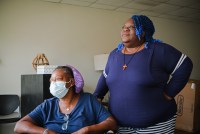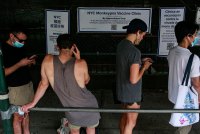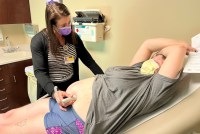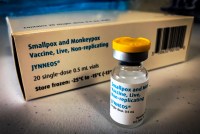Latest KFF Health News Stories
A Disability Program Promised to Lift People From Poverty. Instead, It Left Many Homeless.
A federal disability program meant to provide basic income for people unable to work has left many of its recipients homeless. Advocates for the poor say the crisis is growing worse as rents rise and Congress decides whether to make changes to the program that would affect millions of people.
Impending Hospital Closure Rattles Atlanta Health Care Landscape and Political Races
The nonprofit owners of Atlanta Medical Center, a 460-bed Level 1 trauma center in the heart of the city, plan to close the hospital in November. As many community members worry about the hole the closure will leave in the city’s safety net, the news has thrust health care into the political spotlight less than two months before Election Day.
Rural Americans Have Difficulty Accessing a Promising Cancer Treatment
Chimeric antigen receptor T-cell therapy has eliminated tumors in some late-stage cancer patients, but the cost and complexity of care mean rural Americans have trouble accessing the treatment.
Policies to Roll Back Abortion Rights Will Hit Incarcerated People Particularly Hard
People in jails and prisons are particularly vulnerable to the fallout from the Supreme Court’s reversal of Roe v. Wade.
For Kids With Kidney Disease, Pediatric Expertise Is Key — But Not Always Close By
A study published in JAMA leads to questions about the uneven distribution of pediatric nephrologists nationwide. Children with end-stage kidney disease feel the impact.
Community Health Centers’ Big Profits Raise Questions About Federal Oversight
Nonprofit federally funded health centers are a linchpin in the nation’s health care safety net because they treat the medically underserved. The average profit margin is 5%, but some have recorded margins of 20% or more in three of the past four years.
El cáncer de piel siempre es un riesgo, pero puede pasar inadvertido en pieles oscuras
Históricamente, los afroamericanos y las personas de piel oscura han quedado al margen de los esfuerzos para combatir el cáncer de piel.
Skin Cancer Is a Risk No Matter the Skin Tone. But It May Be Overlooked in People With Dark Skin.
Black people and those with high levels of melanin in their skin have long been left out of efforts to combat skin cancer. Historically neglected both by sunscreen manufacturers and a medical community lagging in diversity and cultural competency, many people with dark skin tones have not been informed about sun safety or how to monitor their skin for damage or cancer.
La línea de salud mental 988 se expande, pero no demasiado en las zonas rurales
La línea 988 de National Suicide Prevention Lifeline, que se lanzó el 16 de julio, fue diseñada como una herramienta universal de apoyo a la salud mental para quienes llaman en cualquier momento y desde cualquier lugar.
The US Mental Health Hotline Network Is Expanding, but Rural Areas Still Face Care Shortages
On July 16, a three-digit number, 988, became the centerpiece of a nationwide effort to unify responses to Americans experiencing mental health crises. But many people, especially those in rural areas, will continue to find themselves far from help if they need more support than call operators can offer.
To Stem the Spread of Monkeypox, Health Departments Tap Into Networks of Those Most at Risk
Although the disease is currently spreading almost exclusively among men who have sex with men, some cases are turning up in other populations — and that number is likely to grow if public health officials don’t effectively nip the outbreak in the bud.
Nurse Midwives Step Up to Provide Prenatal Care After Two Rural Hospitals Shutter Birthing Centers
Dozens of Iowa hospitals have closed their birthing units. A team of University of Iowa nurse midwives can’t reopen them, but they’ve found a way to provide prenatal checkups and other crucial services in two towns.
As California Welcomes Ukrainian Refugees, Counties Fall Short on Interpreters
As Ukrainians settle in California, many are tapping Medi-Cal. But in some counties, particularly Sacramento, the health department doesn’t have enough interpreters.
‘An Arm and a Leg’: One ER Doctor Grapples With the Inequities of American Health Care
This episode is an interview with Dr. Thomas Fisher, author of “The Emergency: A Year of Healing and Heartbreak in a Chicago ER.”
Igual que con covid, atraso en pruebas y vacunas para la viruela del simio
Los casos de la viruela del simio siguen aumentando, pero la respuesta sanitaria es lenta: escasean las pruebas y las dosis de la vacuna que puede prevenir la infección.
Vaccine and Testing Delays for Monkeypox Echo Failures in Early Covid Response
Public health officials say monkeypox is not as dangerous as covid and can be handled well with current treatments and if those at risk use caution. But the rollout of vaccines has been slow and led to angst among some at-risk people.
El calor extremo puede causar calambres, agotamiento por calor e insolación. El calor extremo contribuyó a la muerte de unas 12,000 personas en Estados Unidos cada año entre 2010 y 2020, según un estudio de la Universidad de Washington. Es probable que esas cifras aumenten.
LA’s First Heat Officer Says Helping Vulnerable Communities Is Key to Achieving Climate Goals
Los Angeles taps Marta Segura, director of the city’s climate emergency mobilization office, as its first heat officer. Segura, the first Hispanic person to hold such a position in the country, will work across city departments on an early warning system while developing cooling strategies.
Journalists Investigate Private Equity, Medical Debt, and Mental Health Care
KHN and California Healthline staff made the rounds on national and local media this week to discuss their stories. Here’s a collection of their appearances.
Medical Bills Can Shatter Lives. North Carolina May Act to ‘De-Weaponize’ That Debt.
Medical debt is most prevalent in the Southeast, where states have not expanded Medicaid and have few consumer protection laws. Now, North Carolina is considering two bills that could change that, making the state a leader in protecting patients from high medical bills.






















